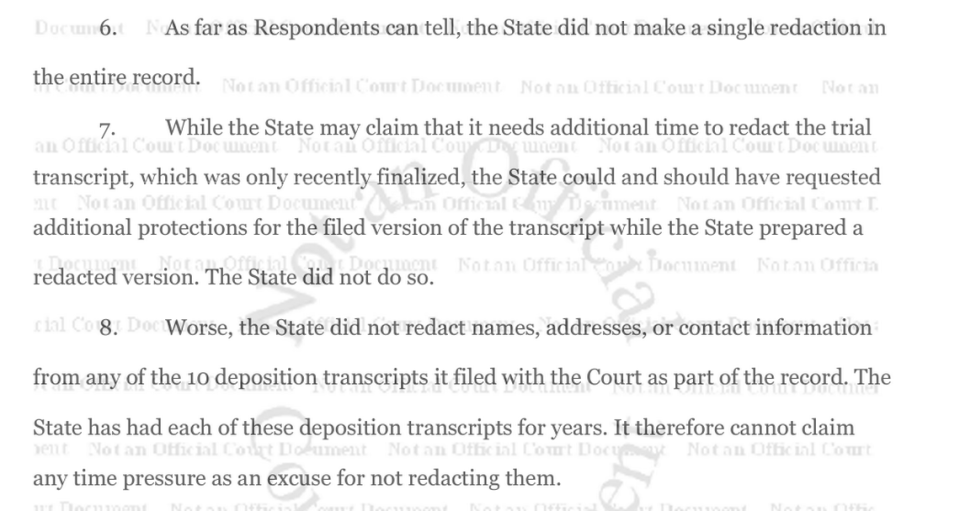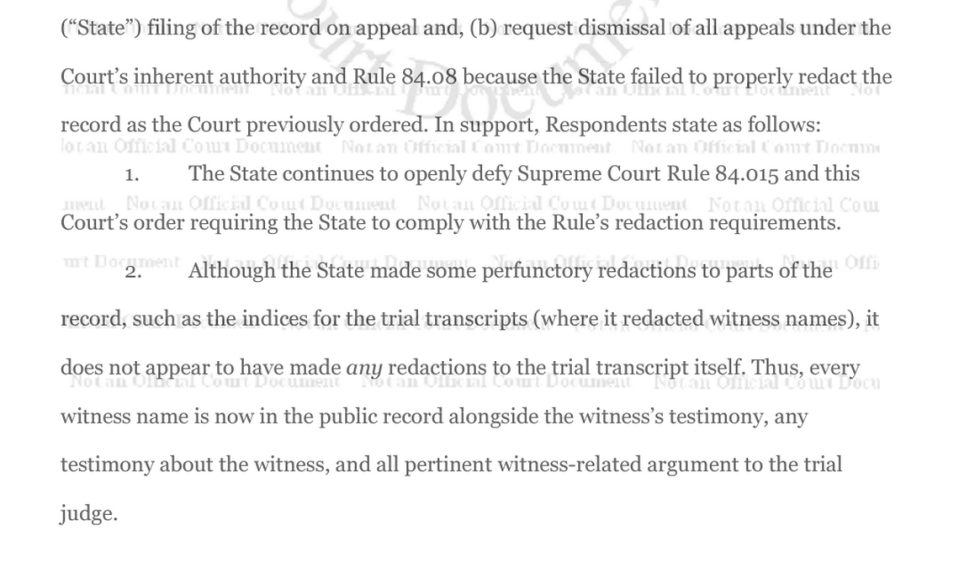Missouri AG released confidential witness info weeks before accusing KC of doxxing Butker
Before Missouri Attorney General Andrew Bailey accused Kansas City of “doxxing” Chiefs kicker Harrison Butker, his office failed to redact witness names, addresses and contact information from court documents in a $23 million lawsuit against the state.
A judge this spring twice ordered Bailey, a Republican in a competitive primary race, to better remove personal information in response to redaction problems.
HHS Technology successfully sued the state over breaches of contract related to the state’s Medicaid system, with the Cole County Circuit Court in 2022 awarding the Florida-based company roughly $23 million. When Bailey’s office submitted the court record this March as part of the appeals process, lawyers for HHS wrote that Bailey’s office “did not make a single redaction in the entire record.”
Bailey’s office submitted a trial transcript without any redactions, as well as 10 deposition transcripts without any redactions of names, addresses, or contact information. At least three depositions previously filed under seal were filed publicly, the HHS lawyers wrote in a motion that sought to toss the appeal.
“The State has unilaterally violated the confidentiality required of those depositions by filing them here and making them available to the public,” Kansas City-based attorney Ken Barnes wrote for HHS in a March 11 filing.
Bailey’s redaction problems had been playing out in court for weeks when he seized on the Butker controversy.
A devout Catholic, Butker earlier this month delivered the commencement address at Benedictine College, a Catholic liberal arts college in Atchison. He said one of a woman’s most important titles is “homemaker” and referred to LGBTQ Pride Month as an example of the “deadly sins.”
Last Wednesday, Kansas City’s official account on X posted: “Just a reminder that Harrison Butker lives in the City of Lee’s Summit.” The city deleted the post within minutes and both the city and Mayor Quinton Lucas apologized.
Bailey and other conservatives quickly held up the post as doxxing, generally defined as publishing private or identifying information about someone as a form of harassment or revenge. On Thursday, Bailey wrote to Lucas that “your office’s X account likely publicly released residential information on a private citizen, Harrison Butker, in an attempt to retaliate against him” for expressing his religious views at Benedictine.
“My office is demanding accountability after @KansasCity doxxed @buttkicker7 last night for daring to express his religious beliefs,” Bailey posted on X.
Lucas wrote back that statements by Bailey had contributed to online threats toward Black women employed by the city.

While Kansas City posted Butker’s city of residence, which was easily available, Bailey’s office filed court documents that contained addresses and contact information, according to lawyers for HHS.
Missouri Supreme Court rule 84.015 governs redaction requirements for appeals courts. Confidential information requiring redaction can include the names, addresses, and contact information of informants, victims and witnesses.
Barnes, the attorney for HHS, wrote in a March 11 motion seeking to strike the record on appeal that the failure by the Missouri Attorney General’s Office to redact the documents was “harmful to the individuals the redaction rule was designed to protect.”
Bailey’s office initially rejected that it had failed to properly redact documents. In response to Barnes, J. Patrick Sullivan, chief counsel in the litigation section of the Missouri Attorney General’s Office, called the matter “trivial” and wrote that under HHS’s theory, names of plaintiffs and addresses necessary to serve court papers to parties in lawsuits must be redacted.
“But that is not the case, and cannot be the case,” Sullivan wrote. “Neither the General Assembly nor the Supreme Court could have intended something so illogical and unmanageable.”

Missouri Court of Appeals Western District Chief Judge Gary Witt in a one-page order on April 2 opted against dismissing the appeal but found that the record “was not sufficiently redacted” and ordered Bailey’s office to comply with the Supreme Court rule requiring the redaction of the names, addresses and contact information of witnesses.
The appeal of the HHS case comes with expensive stakes for Missouri. The state has not yet paid the $23 million judgment against it, which is accumulating 9% annual interest until paid.
Prominent Missouri lobbyist Steve Tilley, a former Missouri House speaker, lobbies for HHS with the General Assembly along with two other lobbyists. Tilley in 2022 hosted a fundraiser supporting Bailey, the Missouri Independent reported at the time, with contributions going to a Tilley-connected PAC.
Bailey was Gov. Mike Parson’s top lawyer before he appointed Bailey to take over as attorney general in January 2023 after the resignation of Eric Schmitt, who joined the U.S. Senate. In the Republican primary, he faces Will Scharf, a former federal prosecutor who is a lawyer for former President Donald Trump.
Bailey has taken an aggressive, sometimes bombastic approach in office, emphasizing the causes and concerns of Republicans. He has sued the Biden administration multiple times, and recently demanded the U.S. Department of Justice turn over documents related to the criminal cases against Trump.
The Missouri Attorney General’s Office didn’t respond to questions.

Failure to redact
Witt’s April 2 order didn’t end the dispute over redactions.
A week later Barnes again asked the judge to toss the appeal, writing that Bailey’s office continued to “openly defy” redaction rules.
While the Missouri Attorney General’s Office had redacted the indices of trial transcripts, it didn’t appear to have redacted the transcripts themselves, Barnes wrote. Witnesses’ names were still available, along with the names of jurors.
“At this point, the State’s failure to follow Rule 84.015 cannot be attributed to negligence or mistake,” Barnes wrote.

Sullivan responded three days later in a filing that attributed the redaction failures to an “internal mistake,” “inadvertent error” and misunderstanding by Bailey’s office. The lack of redactions “was in no way an attempt not to comply with this Court’s Order,” Sullivan wrote.
On April 24, Witt again denied the motion to toss the appeal. But the judge ordered Bailey’s office to again review transcripts and depositions for redactions. He added to the new order that failure to comply may result in the appeal’s dismissal.
By May 1, HHS had filed more court papers alleging that Bailey’s office had still failed to properly redact all documents. This time, Barnes wrote, the Missouri Attorney General’s Office hadn’t filed any of the 10 deposition transcripts that were originally identified as lacking redactions.
“The State’s conduct here is inexplicable,” Barnes wrote.
Sullivan’s explanation, filed May 6, was that Bailey’s office did not understand Witt’s order to include re-filing the deposition transcripts. He called the failure to re-file the deposition transcripts an “inadvertent error” and said they would be re-filed with redactions.
Bailey’s office had acted in good faith, Sullivan wrote, urging the judge not to dismiss the appeal.
Witt denied the motion last Wednesday without explanation.

